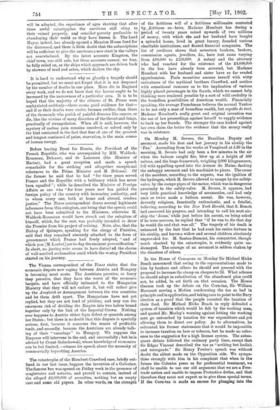Before leaving Brest for Russia, the President of the French
Republic, who was accompanied by MM. Waldeck- Rousseau, Delcasse, and de Lanessan (the Minister of Marine), had a great reception and made a speech remarkable for the striking and altogether exceptional references to the Prime Minister and M. DekassC. Of the former be said that he had " for three years served France and the Republic with a brilliancy which has never been equalled "; while he described the Minister of Foreign Affairs as one who "for four years now has guided the foreign policy of the country with increasing authority, and to whom every one, both at home and abroad, renders justice." The Times correspondent draws several legitimate inferences from this eulogium, one being that the speech could not have been submitted to the Ministers, otherwise M. Waldeck-Rousseau would have struck out the eulogium of himself, which, for the rest, was probably intended to deter the Premier from his project of retiring. Note, also, that the Bishop of Quimper, speaking for the clergy of Finistere, said that they remained sincerely attached to the form of government which France had freely adopted, " and of which you [M. Loubet] are to-day the eminent personification." In short, no jarring note seems to have disturl ed the chorus of well-merited acclamation amid which the worthy President started on his journey.






































 Previous page
Previous page